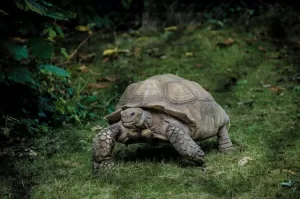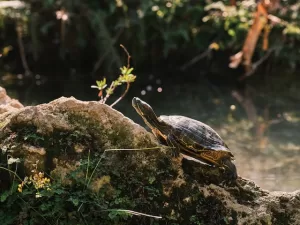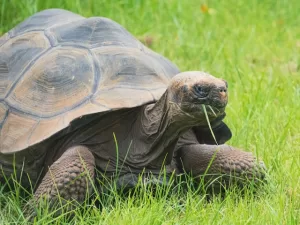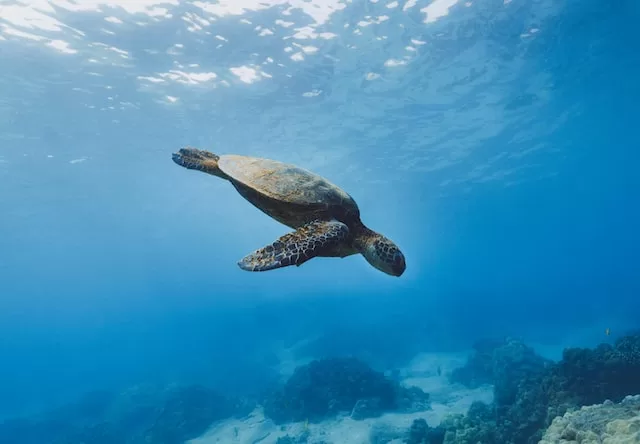Tortoises live on land while turtles live in water. Tortoises also have shorter necks and legs than turtles, and their shells are more rounded. Turtles typically have flatter shells and can swim well.
Turtles are generally smaller than tortoises, with a more streamlined shell that helps them swim faster. Tortoises, on the other hand, have a heavier, domed shell that protects them from predators. Turtles are also more prone to being active during the day, while tortoises are most active at night.
The difference in appearance between turtles and tortoises
Photo by Luca Ambrosi on Unsplash

There are a few key differences in appearance between turtles and tortoises. Firstly, turtles tend to have a more streamlined, hydrodynamic shell, while tortoises have a heavier, boxier shell. This difference is due to the different habitats that these two animals occupy – turtles spend most of their time in the water, while tortoises are land-dwellers. Secondly, turtles typically have webbed feet which help them to swim, while tortoises have stumpy, clawed feet for digging and moving around on land. Finally, turtles usually have long tails, while tortoises’ tails are much shorter.
The difference in habitat between turtles and tortoises
Photo by Pauline Bernfeld on Unsplash

Turtles and tortoises differ in their habitat preferences. Turtles typically live in watery environments, while tortoises tend to prefer dry land. This difference is due to the different adaptations of each species. Turtles are well-suited for life in the water, with their streamlined bodies and webbed feet. Tortoises, on the other hand, have sturdier legs and heavier bodies that allow them to navigate dry land more easily.
The difference in diet between turtles and tortoises
(Photo by engin akyurt on Unsplash)

Turtles are mainly carnivorous, eating fish, invertebrates, and other small animals. Tortoises are mostly herbivorous, eating leaves, grasses, and other plants. Some tortoises will also eat insects or carrion.
The difference in behaviour between turtles and tortoises
Turtles and tortoises differ in behaviour due to their differing anatomy. Turtles are generally smaller and have a shell that covers their entire body. Because of this, turtles can swim quickly and easily, which helps them escape predators. Tortoises, on the other hand, are larger and have a shell that covers only their back. This makes them slower on land, but they can use their strong legs to dig burrows for protection from predators.
How to tell the difference between a turtle and a tortoise?
For starters, turtles live both in water and on land, whereas tortoises are strictly land-dwellers. Turtles also have webbed feet and a streamlined shell that helps them swim quickly through the water, while tortoises have stubby legs and a hard, domed shell that is better suited for walking on land.
Another way to tell the difference between a turtle and a tortoise is by their diet. Turtles are mostly carnivorous and eat things like insects, small mammals, and other vertebrates. Tortoises, on the other hand, are mostly herbivorous and graze on grasses, leaves, and other plant matter.
Finally, turtles tend to be much smaller than tortoises. The largest turtle species can reach lengths of up to 4 feet (1.2 meters), but most are much smaller. Tortoises, meanwhile, can grow to lengths of up to 6 feet (1.8 meters).
Are tortoises and turtles related?
Yes, tortoises and turtles are related. They both belong to the same reptile family, Testudinidae. However, there are some key differences between them. Tortoises are land-dwelling creatures with thick, heavy shells that protect them from predators. Turtles, on the other hand, spend most of their time in water and have lighter shells.
Can tortoises live in water?
Tortoises are not built to live in water like turtles are. Tortoises spend most of their time on dry land and need to be able to access a dry area to rest and bask in the sun. While some tortoises may be able to swim for short periods, they will eventually drown if they are unable to get out of the water to rest and dry off.
Will a turtle bite you?
As for whether or not a turtle will bite you, it depends on the species. Some turtles, like box turtles, are gentle and unlikely to bite unless they feel threatened. Other species, like snapping turtles, can be quite aggressive and may bite if they feel startled or threatened. If you’re unsure about a particular turtle’s temperament, it’s best to err on the side of caution and avoid handling it.
Does a tortoise lay eggs without mating?
No, tortoises cannot lay eggs without mating. Tortoises must mate to produce offspring. The female tortoise will typically lay a clutch of eggs after she has mated with a male. The number of eggs laid by a tortoise can vary, but it is typically between 2 and 12 eggs.
How can you tell if a turtle is a male or a female?
There are a few ways to tell if a turtle is male or female. One way is to look at the shape of the turtle’s shell. Male turtles usually have a longer and wider shells than females. Another way to tell the difference is by looking at the turtle’s tail. Male turtles typically have a longer and thicker tails than females. Finally, you can also tell the sex of a turtle by looking at its claws. Male turtles typically have longer and sharper claws than females.
What is the maximum age of a tortoise?
There is no definitive answer to this question as tortoises can live for a very long time, with some individuals reaching an age of over 150 years old. However, the maximum age that has been recorded for a tortoise is thought to be around 250 years old.
Featured Image by Jakob Owens on Unsplash








